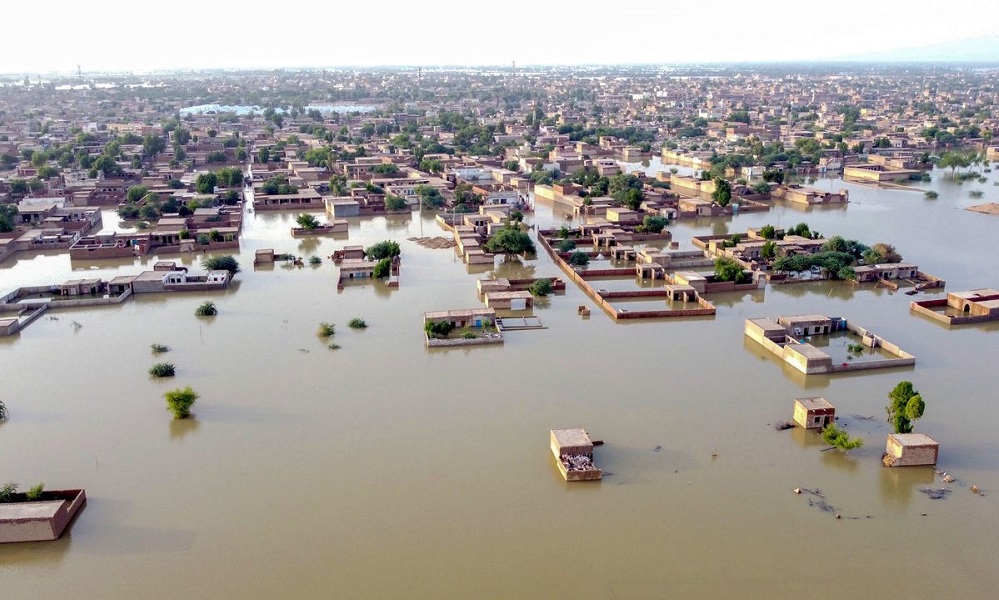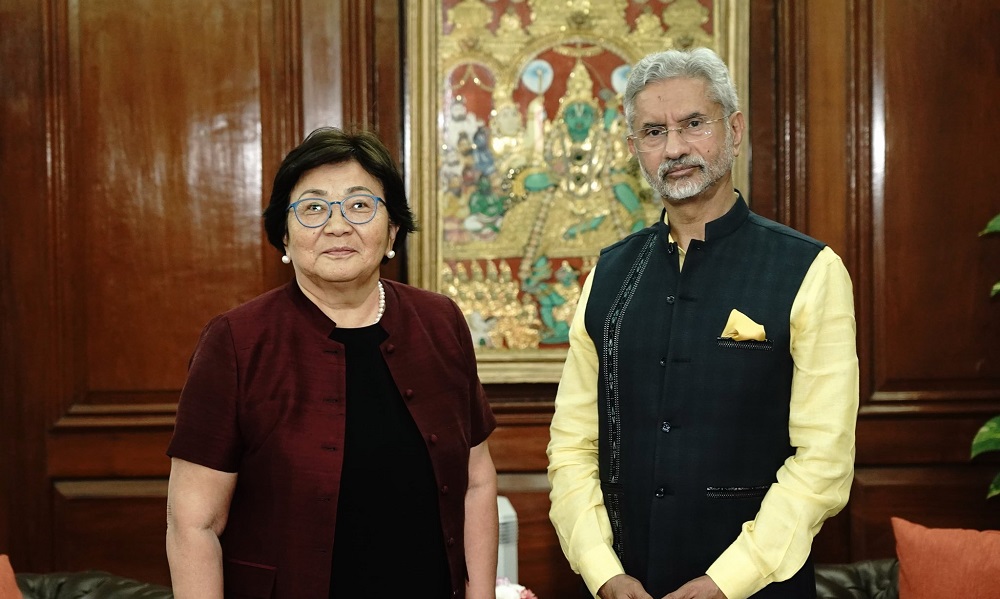Latest News
Floods in Pakistan threaten Afghanistan’s food supply: UN

The devastating floods in Pakistan will place huge strains on efforts to get food into neighboring Afghanistan to relieve its catastrophic humanitarian crisis, the United Nations warned on Friday.
The UN’s World Food Programme said much of the food aid transited through Pakistan by road — a network that has been severely affected by the worst floods in the country’s history.
“We’re focused absolutely on the needs of the people in Pakistan right now but the ramifications of what we’re experiencing here go wider,” WFP’s Pakistan country director Chris Kaye said.
“We’re becoming very, very concerned about the overall food security, not only in Pakistan in the immediate and medium term, but also for what it’s going to imply for the operations in Afghanistan.
Large amounts of its food enter via the port of Karachi. “Pakistan provides a vital supply route into Afghanistan,” he said.
“With roads that have been washed away, that presents us with a major logistical challenge,” Kaye said.
“WFP has procured over 320,000 metric tonnes in the past year to support operations in Afghanistan. The floods in Pakistan are going to put a huge dent in that capability.”
He said there was a “major problem” in restoring agricultural production in Pakistan to feed its own people and continue supplying food to Afghanistan.
A further issue was that the wheat harvest was being stored in flooded areas of Pakistan, and “a large proportion of the wheat has been washed away.”
He said the food security situation in Pakistan was “grave” even before the floods, with 43 percent of people food insecure and the country ranking at 92 out of 116 on the Global Hunger Index.
Monsoon rains have submerged a third of Pakistan, claiming more than a thousand lives since June and unleashing powerful floods that have washed away swathes of vital crops and damaged or destroyed more than a million homes.
Officials have blamed climate change, which is increasing the frequency and intensity of extreme weather around the world.
Afghanistan’s 38 million people face a desperate humanitarian crisis — aggravated after billions of dollars in assets were frozen and foreign aid dried up when the Islamic Emirate took over a year ago.
Latest News
IEA urges World Bank to resume work on 7,000 incomplete projects

Officials at the Ministry of Rural Rehabilitation and Development (MRRD) say 7,000 incomplete projects of the World Bank are at risk of destruction in Afghanistan. They call on the World Bank to resume the work of these projects.
According to them, discussions have been held with the World Bank about these projects, but there has been no result yet.
“7,000 incomplete projects are being destroyed, and if the work is not started, these projects will be destroyed. We ask the World Bank to resume the work of these projects as soon as possible,” said Noorul Hadi Adel, the spokesperson of MRRD.
Meanwhile, members of the private sector also ask international institutions to resume their work in Afghanistan.
According to the officials of this sector, with the start of these projects, job opportunities will be provided for thousands of people in the country.
“These projects create employment for our people and the country will grow a lot,” said Mirwais Hajizadeh, a member of the private sector.
However, economic experts stated if the work of these projects does not start soon, they will be destroyed and the investments made in them will be wasted.
Latest News
Ten people killed by floods in Helmand

Ten people have been killed and six others injured by floods in Helmand province in the past week, local officials said on Friday.
According to officials, seven of those were members of the same family, and they were killed in Kajaki district last night.
“Most of the people moved from vulnerable areas to high lands and mountains, and thanks Allah the number of casualties is low,” Sher Mohammad Vahdat, the head of information of the Directorate of Information and Culture in Helmand, said adding rescue teams and security forces have been dispatched to help people.
It is said that the telecommunication system has also been disrupted due to the effect of floods in Kajaki district. Floods have also destroyed thousands of acres of agricultural land.
Latest News
UN envoy meets Indian foreign minister to discuss Afghanistan

Roza Otunbayeva, the UN Secretary General’s Special Representative for Afghanistan, met with the Indian Foreign Minister Subrahmanyam Jaishankar in New Delhi and discussed issues related to Afghanistan, it was announced on Thursday.
During the meeting, Otunbayeva thanked India for “its critical humanitarian support and longstanding friendship for the Afghan people” and discussed the importance of regional and international cooperation to address prevailing challenges in Afghanistan, UNAMA said on X.
Jaishankar also said on X that the sides exchanged views on the current situation in Afghanistan.
“Underlined that India has provided wheat, medicines, pesticides and school supplies. Appreciate the role of UN agencies as partners in these endeavors,” he said.
-

 Sport4 days ago
Sport4 days agoACL fever grows as fixtures finalized
-

 World4 days ago
World4 days agoUS will not take part in any Israeli retaliatory action against Iran
-

 Latest News4 days ago
Latest News4 days agoOver 50 people dead in traffic accidents over Eid
-

 Latest News4 days ago
Latest News4 days agoUS identifies Kabul airport suicide bomber
-

 Latest News4 days ago
Latest News4 days agoGood rains enable DABS to increase power production in Kabul
-

 Business4 days ago
Business4 days agoAfghanistan-Kazakhstan chamber of commerce opens in Herat
-

 World3 days ago
World3 days agoIsraeli military vows response to Iran attack as calls for restraint mount
-

 Latest News3 days ago
Latest News3 days agoPakistani police give Afghans in Balochistan one day to leave
























